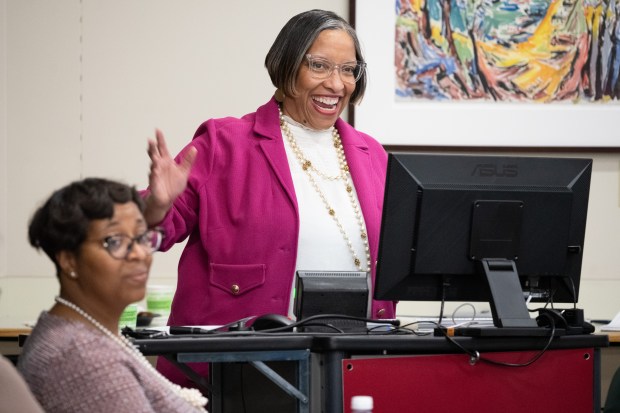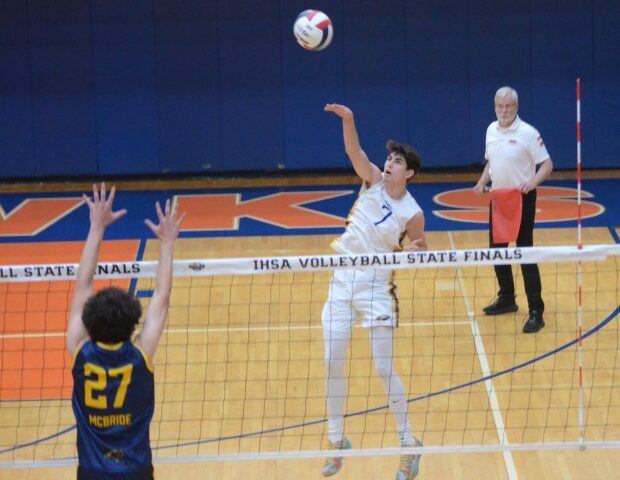My Brother’s Keeper Lake County has been fast-tracked for national certification from the Barack Obama Foundation and participants of the group’s Local Action Summit on Wednesday learned about the process.
The Summit was one of many steps the organization has taken since its launch in 2014 to become certified and more importantly, organizers say, to positively impact the lives of youth and young men of color in Gary and Northwest Indiana.
Lake County Prosecutor Bernie Carter, a longtime champion of the project, and Dr. Danita Johnson Woods, CEO of Edgewater Health, the MBK administrator, were joined by representatives from Indiana University Northwest, the Purdue Extension, Lake County Clerk’s office, and State Rep. Vernon Smith, D-Gary, to provide an update on My Brother’s Keeper Lake County and its steps forward.
Dr. Karen Bishop Morris, chief development officer for Edgewater Health, currently is the lone employee working on the development of MBK Lake County with the assistance of a team of volunteers and board members.
Currently there are 150 communities identified by the national MBK organization as Legacy or new communities. These are the communities that have expressed interest in the model and getting started. There are 103 communities in the MBK leadership network, the middle tier.
Morris said she found out Tuesday from the national MBK organization there are five communities across the country the national organization is focused on investing in and getting certified as soon as possible through the Barack Obama Foundation.
“We are one of them…We do have national support. Once we are a certified community it will open up more avenues of funding and other capacity building and resources,” Morris said.
Ken Iwama, IUN chancellor, extolled the collaboration between the university and MBK as meeting the university’s mission of providing life-changing social, economic and cultural opportunities for its students.
The MBK Challenge focuses on six milestones, ensuring all children: enter school cognitively, physically, socially and emotionally ready; read at grade level by third grade; graduate from high school; complete post-secondary education or training; obtain employment out of school; and remain safe from violence.
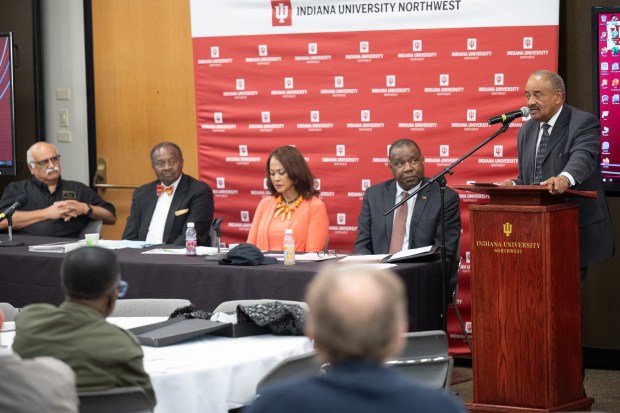
Iwama said it wasn’t just the six milestones of the My Brother’s Keeper program that impressed the university but the “incredible passion” of the participants and how intentional the program is in achieving the outcomes.
Carter agreed.
“My Brother’s Keeper has a proven track record in the lives of young men,” Carter said.
Carter said he has been no stranger in talking about the deficiencies in how children are raised. He said it is not intended as a negative. Initiatives such as My Brother’s Keeper can help change the narrative throughout the community and improve outcomes.
“Most parents, including myself, raise your children how you’ve been raised,” Carter said. The way children are raised often is repeated by the next generation, and it is very difficult to break a negative cycle.
Carter said the group has checked off items one at a time to get closer to certification, from working with legislators to hosting the summit and an earlier symposium. Since 2014, the group has also taken steps to address milestones like improved graduation rates and has been documenting its successes.
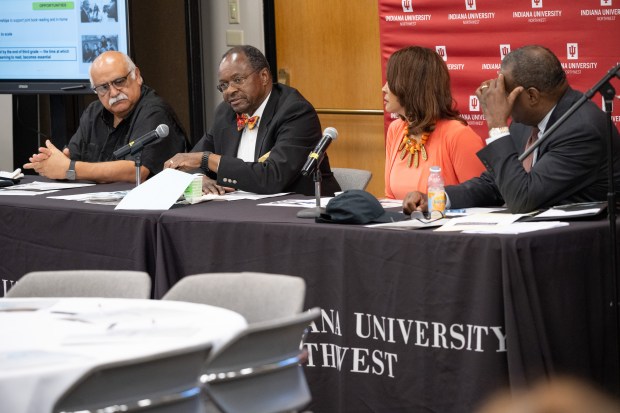
Dr. Steve Simpson, a retired pediatrician from Gary, has spent 40 years as a literacy advocate stemming from his own problems learning to read as a youth. Once in college, he said he learned new reading skills and became a voracious reader.
“It’s important. I wish I had learned to read before I started kindergarten,” Simpson said. Starting to read earlier in life builds a foundation for learning and future success.
“Children who are not exposed to reading tend to be delayed and get behind,” Simpson said, adding once a child gets behind it becomes difficult and in many cases impossible to catch up without some type of phenomenal event that turns things around.
“Most kids don’t get those phenomenal events. They get more and more trauma, and go further and further away from learning,” Simpson said. “We have to find ways to teach our kids to read instead of just showing them a book.”
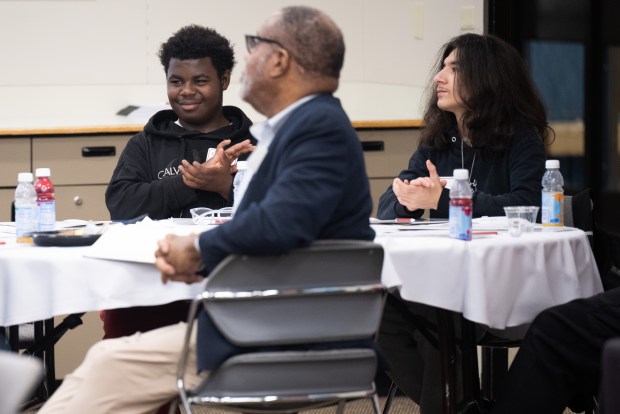
Attendees at the summit included a variety of community leaders, educators and officials. The group also was joined by 12 young men from Calumet High School. The students and community leaders were expected to gather in break-out groups to discuss the topics raised and get input from the youth on what they need and see in the community.
Morris said the initiative is not trying to reinvent the wheel but to create partnerships with existing service providers and help them become more effective and efficient in the ways they reach out.
“This afternoon listening session is central to the model, which is the young men of color should be driving this. You really are the reason…why we are here,” Morris told the teens, adding their input would help form the steps forward.
“One of the great things about this model is OK, the categories are clear, we have flexibility within the community to define, shape and redefine the approach to achieving the goals,” Morris said. This allows stakeholders to identify what is the most relevant to them.
“I think the portability and flexibility are important to keep in the back of your mind as you are having discussions,” Morris said.
“This is not the work of one individual or one organization. That’s why we are all here today,” Morris said.
State Rep. Smith said MBK will lead to improvements in Lake County, Northwest Indiana, the state and the nation.
“Our greatest natural resource is not the rolling waters of the Midwest; it’s not the trees that are part of the redwood forest; it’s not the gold deposited in the depositories… Our greatest natural resources are our people. MBK is an effort to invest in people, the greatest natural resource of this country,” Smith said.
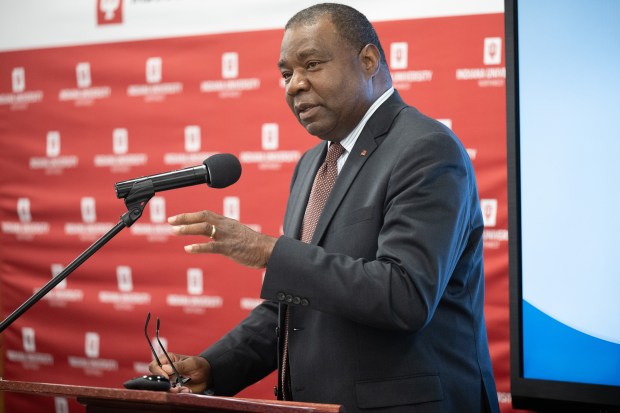
Carter said while the initial mission is targeting young men, they intend to provide similar assistance for girls and young women.
“Young girls need their father more than anything,” Carter said. People often think just boys need their fathers as a positive role model but girls need to see and know their fathers are there to take care of them.
“They need somebody to say: ‘He has my back. He’s taking care of me. He has no agenda.’ We don’t have enough of that. We will be directing our attention to young girls (as well) as we form this organization,” Carter said.
cnapoleon@chicagotribune.com


